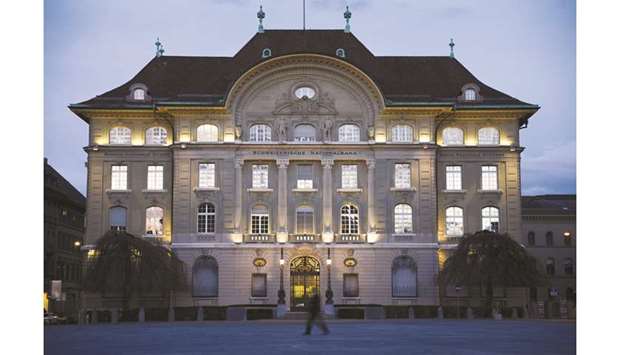The Swiss National Bank will shrug off the European Central Bank’s latest interest rate cut and not trim its own negative rate when it gives its latest monetary policy update tomorrow, according to analysts polled by Reuters.
Over two-thirds, or 26 of 37 economists polled, expected the SNB to leave its policy rate at the current -0.75%, one of the lowest rates in the world, where it has stood for nearly half a decade.
The remaining 11 contributors forecast the SNB would cut rates tomorrow.
No economist had predicted such a move in the last Reuters poll before the June policy decision.
Medians in the poll suggested rates would not be changed until 2021 at least.
Meanwhile, the safe-haven Swiss franc has gained value against the euro in recent weeks, reaching 1.0809 versus the euro on September 4 — its highest for over two years.
The ECB has pledged an indefinite stimulus to revive the ailing eurozone economy with a resumption of bond buying which it shuttered in December and a 10 basis point cut in its deposit rate to -0.5%. Still, the majority of analysts expected SNB chairman Thomas Jordan to hold his ground, giving him leeway to cut later if the franc’s rise accelerates in the coming weeks.
“I think the SNB will refrain as much as possible from changing its rates.
If the CHF were to appreciate too much, it would probably have to reduce its rates by 25 basis points to -1%, but this is not our base scenario,” said Charlotte de Montpellier at ING.
“In the absence of shock, rates should remain at their current level for many years,” she added. The SNB is also expected to keep the interest rate it charges on sight deposits — the excess cash it holds for commercial banks — locked at -0.75%. Analysts were divided over how the SNB will describe the safe-haven franc following the recent appreciation.
One-third of those who answered an additional question expected the SNB to change its wording from the current “highly valued” to “significantly overvalued”. The rest said it would maintain its current language.
The results suggest Jordan is likely to continue relying on market interventions to dampen demand for a currency traditionally sought by investors in times of economic uncertainty.
Most analysts expected currency interventions will be maintained or possibly increased.
Analysis of sight deposits — a proxy for the SNB’s interventions — has shown the central bank was actively producing new francs in July to meet demand.
For some economists, SNB action is just a matter of time.
“We suspect that the SNB will continue to rely on FX interventions over the coming months to withstand upward pressure on the franc before ultimately cutting its policy rate, as well as the rate that it charges on sight deposits, to -1.0% in early-2020,” said David Oxley at Capital Economics.
Despite no loosening of policy expected, economic growth is forecast to accelerate, according to the poll.
The economy will expand 1.0% this year, 1.3% next year and 1.5% in 2021.
Inflation was expected to average 0.6% this year, 0.7% next year and 1.0% in 2021.
The growth forecasts match what the SNB is expected to announce for this year and next but the inflation forecasts were a touch stronger.
The Swiss government cut its 2019 growth forecast by a third yesterday and now expects the country’s economy to grow 0.8% in 2019, down from the June forecast of 1.2% and well below the long-term average increase of 1.7%.

The headquarters of the Swiss National Bank in Bern. The SNB will shrug off the European Central Bank’s latest interest rate cut and not trim its own negative rate when it gives its latest monetary policy update tomorrow, according to analysts polled by Reuters.
